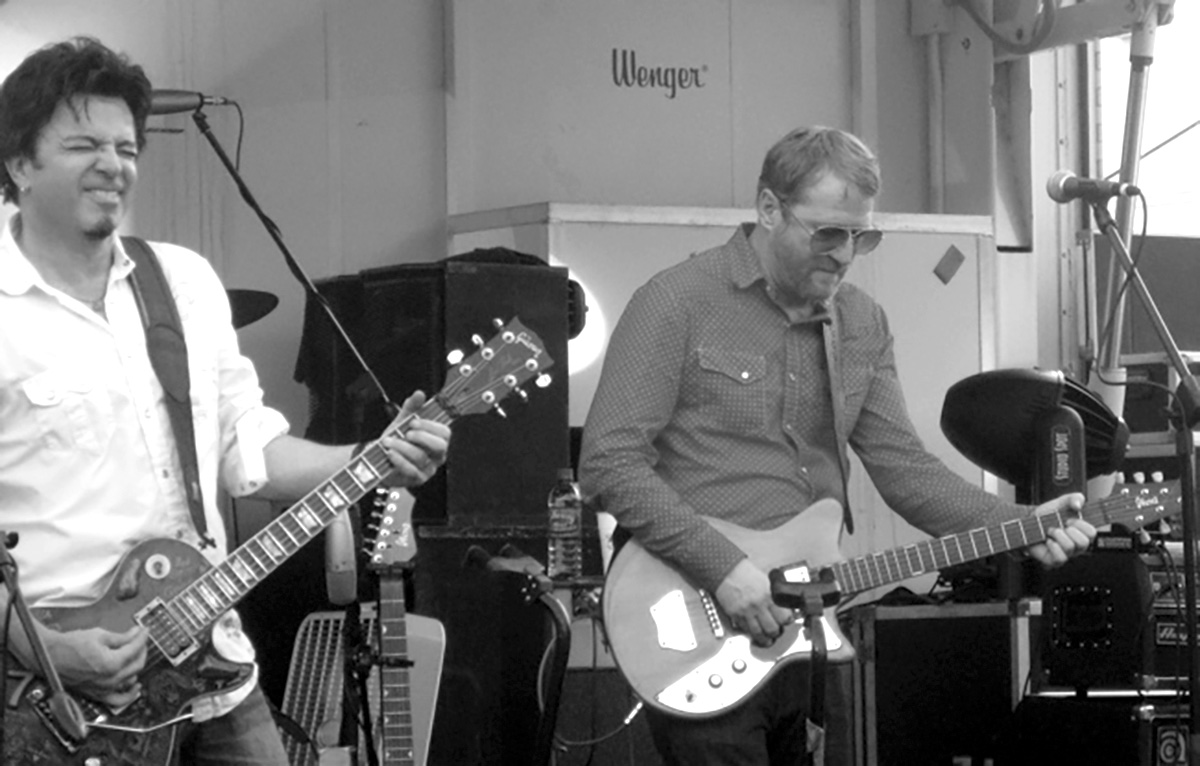With recording ability at their fingertips, fans have made concerts multimedia events. Does it hurt, or help?
David Lowery doesn’t dread the camera flashes or the crude YouTube videos – in fact he welcomes them.
As lead singer for Camper Van Beethoven and Cracker (a pair of bands with faithful followers during decades of work), Lowery embraces his fans’ passion for the live show.
You want audio — click right ahead.
Candid pictures — here I am.
Film it — why not.
Now — about this whole texting business . . .
“We were with Cracker in Macon this past summer, and during the show David had it, saying ‘Can I have that phone?’ to a group of frat kids who were fucking around and texting in the front row,” said Velena Vego, band manager for both Cracker and Camper who also serves as booking agent/talent buyer for Athens’ 40 Watt Club. “It is an irritant with cell phones because what we’re seeing is people just texting in the middle of concerts, and you know the bands can see that. I know that was the place to be that night but they weren’t there watching the concert.”
From their beginnings, Lowery’s bands adopted the Grateful Dead’s approach to concerts – you can film, record and take pictures anytime, but you just can’t sell any of it. This attitude made it easy for Lowery and his bandmates to transition into today’s concert scene – where gigs became multimedia events with an endless shelf life splayed across the Internet.
But with everyone having recording capabilities that fit in the palm of their hands, is the modern-day concert no longer a collective adventure of the moment? Has it become a roomful of individual multi-taskers, texting and waiting for their favorite song so they can call their best friend and raise the phone high above the flashing din?
Are fans devaluing the concert experience?
“I could see where some artists are worried about what is being heard out there if they aren’t regulating what is being taped,” Vego said. “But there’s no way to stop it . . . Personally as a manager for two rock and roll bands I would say we need to embrace this camera policy because at least people are there and they excited about it and they’re trying to spread the word.”
• • •
For all the good technology brings, Benjamin Ferguson still misses the mystery.
President of Nimbleslick Entertainment, a company managing more than a dozen artists including rock mainstay Perpetual Groove, Ferguson recalls a time when bands’ reputations were built on album covers, hearsay and imagination.
“I remember as a kid sitting down with my parents’ record collection and looking at the Led Zeppelin records,” Ferguson said. “I heard stories from friends and my old man about them, but I always remember holding the records and going ‘Man these guys lived in castles. They were into witchcraft. What kind of fucking shit is this? Who are these guys?’
“And now you can wake up and see what your favorite guitarist had for breakfast, and the people who don’t supply enough of that information suddenly get looked down upon. It’s a fine line to balance because as you grow a band and the fan base gets larger, at some point you have to pull back the reins a little bit and develop that mystique.”
It used to be — not too long ago — that being in the music industry meant making records and going out on tour to promote them. Not anymore. Bands are content providers, and it’s through technological ingenuity and reaching out to its fans that a band can rise above the myriad of choices found through a simple Google search.
“It’s 2010 and people aren’t buying records, they’re buying individual singles if that,” Vego said. “Where a band makes more money than anywhere else is the live concert. People might not have all your albums, but they’ll still pay $15 to $20 to see you play a couple times a year.”
A December report by Billboard Boxscore bears this out. Data between December 2008 and November 2009 shows more than 73 million people worldwide spent a record $4.4 billion in concert revenues, an 11.7 percent increase over the previous year and the second straight year of double-digit growth. In the United States, despite a difficult economy, revenue was steady as more than $1 billion was spent on concerts.
Ferguson understands this. It’s through the live show – with its flashes and phones and record buttons – where bands set themselves apart. And those who join in the recording fray with the audience are getting the most mileage.
“People are going to be doing this and it’s going to be very difficult to police, so just let it happen,” Ferguson said. “It adds to the viral factor of band promotions and getting the band’s name out there. From the organizational point of view, we use that stuff quite a bit and there’s an endless amount of ways or applications to go about doing that. We have someone on the road constantly Twittering during the set list, so when the band is playing their songs, he’s putting that out to the Perpetual Groove Twitter list.
We’re also taking video clips from iPhones so there’s usually a video clip, whether it’s 30 seconds of five minutes, that’s tagged with that particular song.”
For PGroove, it extends off the stage as well. All the guys have iPhones, so updating blogs and Web sites can be done anywhere, anytime. The key is keeping fans connected, and so far, it’s working. PGroove shows, in the vein of Phish and Widespread Panic, have found a loyal, well-documented base who go for fun and friends.
The proof is on the screen.
“It’s funny because you look at the photos the kids post up and most of the photos are pretty crappy,” Ferguson said. “But what comes along with those photos are them with their friends before the show, after the show, and they’re all having a good time. It puts together a narrative we would be very hard pressed to produce on our own.”
In the past few years Cracker and Camper added the post-show meet and greet, further breaking down the wall between artist and fan. It’s an easy, and profitable, practice.
“The guys do meet and greets all the time,” Vego said. “Country bands are notorious for that and that’s why they have such a huge following . . . As the band manager with Cracker one of the first things I said was ‘I just think you guys need to go out there and I think you’d sell more CDs if you go out by the merch table and just sit and take a picture and sign a CD.’ And it works, we know it automatically does better for our sales.”
• • •
But this blasting of barriers is not for everyone.
Performers as varied as indie crooner M. Ward to country superstar Kenny Chesney have shunned cameras and recording at their shows, posting signs and pulling people out of aisles for shooting out of turn.
In Chesney’s case, the breaking point came last summer after filming fans had him tripping over lyrics. In Boston it was reported he took a fan’s camera mid-show, returning it later unharmed but without the memory card. A notice on Chesney’s Web site informed of a no camera policy, adding “your bags will be checked at the door and you will NOT be allowed admittance with a camera in hand.”
While not banning cameras at shows, Band of Horses’ lead singer Ben Bridwell takes none too kindly to the practice. In an interview with Pitchfork, Bridwell wrapped up his feelings such: “Everyone’s got a fucking camera in their hand and, I don’t know, is there no sanctity left for live performance with going to a show and seeing it with your own eyes and remembering it? Do you have to tape every second, or even just your favorite song?”
Vego, whose role as 40 Watt’s booking agent is for the venue to abide by each band’s particular request, doesn’t see many artists seek a camera ban. Still, there are exceptions.
“Some people will say no videos, especially if they’re doing newer songs because they don’t want those to get out until the new record comes out, but I would say by and large they really do not care about the camera thing,” she said. “There’s definitely going to be artists that come in and don’t want anything. Social Distortion was no cameras no video and we had to put that sign out right when people walked in that you cannot bring cameras and video in.”
Peter Corbett has a crisp message for those in resistance,
“I’ll make it simple — get over it,” he said. “It’s hurting your bank account.”
Corbett is the CEO of iStrategyLabs, a company based in Washington D.C. whose mission is to help its clients “connect with audiences online” and “create experiences in the real world that satisfy a brand’s need to engage its target audience in a deep and meaningful way.” Simply put, Corbett helps his clients reach the largest audience they can with all the digital tools they can muster.
Boasting clients such as American Outfitters and Corona, Corbett doesn’t see how a band can survive without using everything at its disposal.
“Bands will have backlash over time if they don’t cater to what it is their fans really want, and what their fans really want is some form of a participation,” he said. “If participation is shooting a photo on my iPhone and uploading it to a specific place where the band pulls it up on their Web site, awesome. Even better, what if the lead singer chooses his favorite fan photo of the week? What artist doesn’t want to be famous? How do you get more famous? You get more pictures and video shot of you. Harness the talent and passion of your fans to promote you, and if you’re not doing that there are other people who will be surpassing you in your rise to fame.”
And financial stability. By not making an effort to compile images and recordings from their fans in one place, bands miss out an opportunity to bring the community into a main marketplace.
“People are herding in a specific way — I’m going to shoot pictures, I’m going to shoot video, I’m going to do this thing — so how do you channel that herd into something that’s going to benefit you? People are inevitably going to be shooting video, etc., I need to be sure I’m pulling all of that content together in a place where I can sell them something rather than it being somewhere else.”
Then again, at a certain level of superstardom, limiting your fan base from doing this or that doesn’t much matter to your bottom line. In Forbes 2009 poll of the top-earning musicians, one country act rises millions above the rest: Kenny Chesney, with a cool $65 million.
How’s that for a snapshot?
• • •
For bands going too far in the other direction – completely bowing to the whims of every fan out there – there’s trouble to be had.
Ferguson’s role with his bands is keeping a balance of what gets shared and what gets saved. On one hand, you want your fans to be informed and happy; on the other, if everything is known, what sense of discovery remains?
“When you don’t have that mystery, you don’t have people in the audience using their imagination into who those people onstage are and that’s one of the allures of rock ’n’ roll and always has been,” Ferguson said. “You get artists who check Facebook or message boards every single day and read all of this stuff and slowly what other people are saying starts to influence them. I’ve seen musicians and bands forgetting who they are and catering to what people are saying to them online, which is a dangerous situation.”
At that point, a band might start to lose what gained them those fans in the first place, which could prove fatal in a musical environment thriving as it moves into a new decade.
“I forget who said it, but a classic quote I heard was ‘there is nothing wrong with music today, there’s a problem with the business model,’ ” Corbett said. “For sure, and that’s changing rapidly. But there’s nothing wrong with music, there’s nothing wrong with bands and I would venture to say the music in the past five years is so much better than it was in the mid to late ’90s.”
So it’s all a matter of timing. Bands today have the luxury of added exposure, but lose the ability to take time finding their way. One bad night, one disgruntled message board pest, one misplaced mic, and a career could end before it starts.
There’s no place to hide, and lack of privacy and time to develop could keep a hidden gem from finding its rightful audience.
“A lot of our clients have fans who are armchair quarterbacks and think they should be doing one thing or another,” Ferguson said. “You don’t ever see musicians or anybody from their organizations getting on those people’s pages and saying, “Well I just went down to the HR department in your company and I really feel like you could be doing things a little bit differently or a little bit better.”
“Think about this: What if Led Zeppelin had all of this technology around in those days, and the band was road testing material and someone said ‘You know what? ‘Stairway to Heaven’ really fucking sucks — I mean, I’m not a fan, it’s way too long.’ Just imagine if that had been the case.”
Imagine there’s no “Stairway to Heaven”?
In our digital world it’s easy, if you try.




